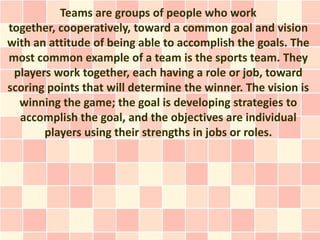
Team Building - Suggestions for Teens
- 1. Teams are groups of people who work together, cooperatively, toward a common goal and vision with an attitude of being able to accomplish the goals. The most common example of a team is the sports team. They players work together, each having a role or job, toward scoring points that will determine the winner. The vision is winning the game; the goal is developing strategies to accomplish the goal, and the objectives are individual players using their strengths in jobs or roles.
- 2. Adolescence is a stage of semi-independence, when all that is needed for adulthood begins to develop. The individual moves from being a member of a family group into personal independence. It is about individual development, as the body becomes an adult's body. The mind struggles with perceptions and interests from childhood but wants more challenging opportunities that decision making (and sometimes problem solving) allows. Adolescence is when teenagers separate more from family and blend with other teens who replace parents as the ones to please.
- 3. The Conflict
- 4. Adolescents want to be separate and unique, allowed to make choices for themselves and prove they are adults (although in training). They reject what has been "normal" and expand their horizons, interests, friendships, and begin creating goals for their futures. Following rules and laws may be difficult, if only because adolescents want to challenge everything in the process of exerting control over their lives.
- 5. Teams or groups working together offer a common goal or vision toward which everyone involves works cooperatively. Rules and laws establish order so everyone can contribute. Learning to work cooperatively with others, either peers or authority figures (teachers will become supplanted by supervisors and bosses), is a critical skill every adult needs to master.
- 6. Why Teamwork Is Important
- 7. Many teens participate in sports or clubs, partially for something to do away from home, parents and siblings, but also to meet their growing interests, talents and skills. Participation in these activities is part of learning adult behavior. Rejecting being a team member can have lasting repercussions for an individual's future.
- 8. Without cooperative performance skills, the person is a difficult employee.
- 9. Work sites are social settings, and cooperative behavior determines the level of safety for everyone. Everyone has the right to be safe physically, mentally and emotionally. Positive, helpful and supportive attitudes are critical. When one individual doesn't work in the same way toward the same goals, one or more types of safety can be compromised. Someone who gossips, ridicules others, or generally discounts others' efforts is a negative or destructive influence. That person tears apart the assembled "team" of which they are a member and sabotages the group's goal(s) and vision(s).
- 10. Most people want to find a job they enjoy doing, having a career that allows them to be independent and self- sufficient. This means they must learn to be governed by rules and laws, social conventions (manners), and people who have the right to tell them what to do. It means they can't be an individual who always determines what, when, where, how and why anything gets done. Even independent business owners must allow others (if only their customers and state and federal regulations) have control over aspects of their lives.
- 11. Without the skills of teamwork, collaboration and social relationships, an individual will have many difficulties in life. They may suffer financial and/or emotionally. There are many people like this. Each person must decide for himself/herself how (s)he is going to live his/her life. The better (s)he is as a team member, the easier life will be.